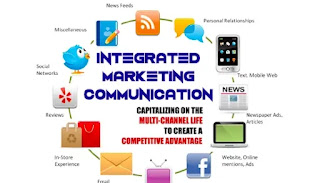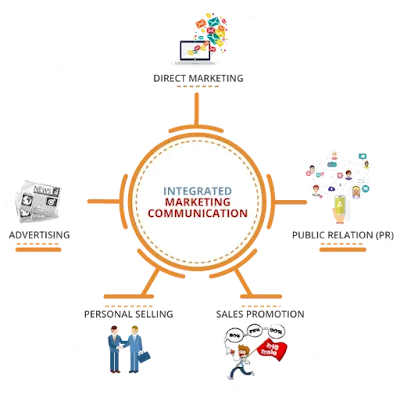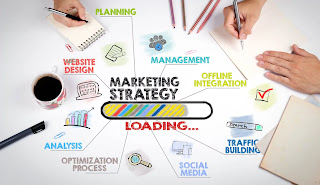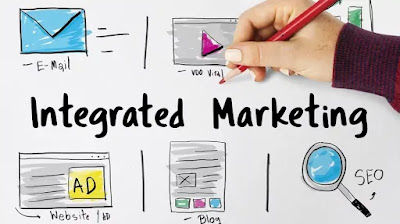You’ve heard
of it, you’ve read about it, and now you want to know more about it. What is
integrated marketing communication (IMC)? It’s your overarching strategy that combines
different forms of marketing and advertising – everything from social media to
email marketing, direct mail to public relations – into one seamless whole. But
why does your business need this? To find out more, please read on...
What Is IMC?

Integrated
marketing communication, or IMC, is a cost-effective way to reach larger
audiences with a consistent message across multiple channels. An IMC strategy
coordinates all of a company's marketing efforts to deliver a unified message
to customers. The benefits of an integrated marketing communications plan are
that it can help increase brand awareness and generate revenue by leveraging
different forms of media like print, TV, social media, radio, internet ads,
email campaigns and more. A strong IMC strategy will also help a company find
new opportunities for growth by opening up access to larger audiences that they
might not have reached before through their previous efforts. With the
increased focus on customer experience and data mining from internet browsing
habits, many companies today would benefit from creating an online presence
with internet marketing such as search engine optimization (SEO) strategies,
paid search advertising (PPC), content creation, digital distribution and
social media platforms.
Why Does
Business Need IMC?

Businesses
need to use an Integrated Marketing Communications strategy to create a unified
message across all channels. The process of IMC involves creating a consistent
brand identity and then using direct marketing, sales promotion, advertising,
public relations, and digital marketing to reinforce that identity. It's
important for businesses to think about what they want their target audience to
believe about them when they see their logo, hear their name, or visit their website.
Developing and implementing an integrated marketing communication plan helps
ensure that you have the same message every time customers come into contact
with your company in any way. An integrated marketing communications process
can be done internally by the company itself or through an agency who
specializes in integrated marketing communications. Integrated marketing
communications agencies will work closely with other companies to coordinate
campaigns so that everything looks cohesive and feels like one big team effort.
How Do You
Set Up an IMC Strategy?
You start by
performing a situation analysis, which is an evaluation of your company's
strengths, weaknesses, opportunities, and threats. This will give you a good
idea of where your company stands in relation to the competition. Next, you'll
set some objectives for your IMC campaign. These should be specific,
measurable, attainable, relevant, and time-bound (SMART). Once you have your
objectives set, you'll need to develop a marketing mix that will help you
achieve those objectives. The marketing mix includes the 4Ps of marketing:
product, price, place, and promotion. Finally, you'll need to create a budget
and timeline for your campaign. And that's it!
The 7 Steps
to Setting Up Your Own IMC Strategy
1. Define
what integrated marketing communication (IMC) is.
2. Set your
business goals.
3. Research
your target audience.
4. Develop
key messages.
5. Create a
communication plan.
6. Implement
the plan and track results.
7. Adjust as
needed and continue tracking results to ensure success.
5 Tips for
Successful Launch of Your IMC Strategy
1. Define
Your Objectives - What do you want to achieve with your IMC strategy?
2. Know
Your Target Audience - Who are you trying to reach with your message?
3. Develop
Key Messages - What points do you want to communicate to your target audience?
4. Select the Right Channels - Which channels will best help you reach your
target audience?
5. Measure, Evaluate, and Adjust - How will you know if your
IMC strategy is successful? Be sure to measure the effectiveness of your
messages by asking these three questions: a) Do we know what our key messages
are? b) Are we targeting the right people for those messages? c) Have we been
measuring our progress against those goals? In order to make adjustments as
needed, have an evaluation plan in place so that you can be prepared for when
changes may be necessary.
5 Ways You
Can Track Its Success
1. Keep
track of your website traffic before and after you launch your IMC campaign. This
will help you see how effective your campaign is in driving traffic to your
site.
2. Use
Google Analytics to track conversions from your website. This will help you see
how many leads or sales you generate from your IMC campaign.
3. Use a
tool like Hootsuite to track mentions of your brand on social media. This will
help you see how much reach and engagement your IMC campaign is getting.
4. Set up
Google Alerts for key terms related to your IMC campaign. This will help you
keep track of any news or online conversations related to your campaign.
5. Keep a
close eye on your competition.





